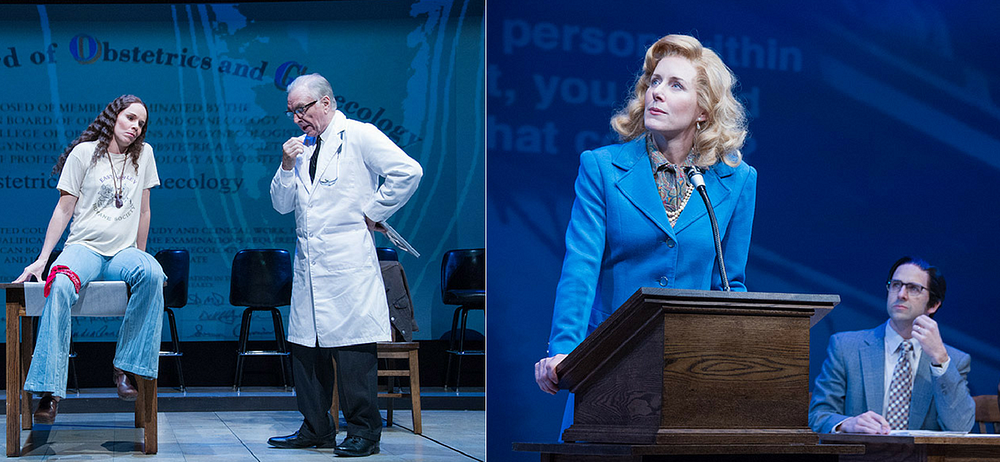Community, Leadership, Experimentation, Diversity, & Education
Pittsburgh Arts, Regional Theatre, New Work, Producing, Copyright, Labor Unions,
New Products, Coping Skills, J-O-Bs...
Theatre industry news, University & School of Drama Announcements, plus occasional course support for
Carnegie Mellon School of Drama Faculty, Staff, Students, and Alumni.
CMU School of Drama
Thursday, January 26, 2017
Remembering the real women in ‘Roe v. Wade’
thinkprogress.org: Jane Roe was a woman. It’s easy to forget that, and what exactly that means, when you think about her as half of Roe v. Wade. Her individuality goes fuzzy at the edges. She was a woman, but now she’s every woman. She was pregnant in America when she didn’t want to be, and now she is invoked, on some level, whenever a woman in America becomes pregnant and doesn’t want to be. Impossible to imagine what choice she would have made all those years ago, when Sarah Weddington, then 26 years old, approached her about being the plaintiff in a case that would legalize abortion in the United States, if she had known what that would really mean. Hard to say how she could have predicted what it would do to her, being Jane Roe, back when she was still just Norma McCorvey.
Subscribe to:
Post Comments (Atom)

3 comments:
This article is, in my opinion, really truly important, not only because it draws attention to the show “Roe”, but because it reminds people that “Roe” was not only a show, and its characters certainly weren’t fictional. I remember seeing “Roe” at the Oregon Shakespeare Festival last summer, and realizing just how little i knew about the incredibly pivotal supreme court case, and the trailblazing people involved in it. When thinking about Jane Roe(Norma Mccorvey) I imagined someone who had given everything in order to make this case a reality, and i never would have guessed that shortly after the verdict, she would convert to the Anti-Abortion movement, which she had fought so hard against. However the show really took the audience into the lives of Norma Mccorvey and Sarah Weddington, and revealed just how little anyone really knew about two leaders of one of the most controversial supreme court cases of our nation. And as many questions as it answered, the show left me with more. But i can say with confidence, that number is much lower due to the insight of the author and interviewer.
One of the biggest problems we have right now is the huge divide between people who share different views on societal values. Almost no one will budge from their positions, almost no one will hear the other side out. People are too quick to assume the worst in the other side, to attack instead of listening, or to just block out entirely. But yet, a lot of people want to bridge this divide and bring the nation together because they see that this polarized division is the biggest issue we face. We can never get there if we refuse to listen to the other side and burst our own little isolated bubbles; we can never get there if whenever we do the other side fails to recognize us as well -- it only antagonizes. This show is important because people from both sides of the issue have gone and seen themselves accurately represented. While it was mentioned that the conservative audience is a minority, it shows that there are people willing on both sides to talk and to listen. This show gives a space where "people with very different points of view can sit together in the dark, which is what theater is, and, together, contemplate an issue." Contemplation is the first step to conversation, especially when you are presented with accurate versions of each side of the issue, and conversation we so desperately need.
It’s so great to read about pieces being produced and performed bringing past events to the present in a concise and clearly relatable way. We didn’t learn much about Roe v. Wade in school even though it was such a huge turning point for women’s healthcare in America, so it was definitely cool to read more about it from the perspective of someone so close to the issue. I appreciated what she said about how seemingly difficult it is for people to discuss the issue of women’s access to abortions because it is a difficult to discuss subject I find, even amongst some of my very liberal friends. Very few people have a positive view of abortion, and that automatically makes many label themselves as “pro-life”- my friend told me yesterday that someone he just met told him he was pro life, but would ultimately want the woman to make whatever choice felt right for her at the time (“so you’re pro- choice?” He said). I had an interesting conversation with my RA last year about how so many liberal women say “I would never get an abortion but I think women who need to should be able to”, to which she said that that rhetoric, regardless of it’s intentions, still demonizes abortion and makes it seem like the “bad” choice to make even though it could be necessary to the well being of the mother and her family. It’s just crazy to me that people can still align themselves with the pro-life movement when Mike Pence himself spoke at the “March for Life”, a man who endorses electrocuting gay kids out of their sexualities and blocking refugees and immigrants from making lives for themselves in America. I don’t know if abortion will ever not be a touchy subject just because of the nature of how we view life and how we picture the potential of lives of fetuses before they are even developed. Regardless, I think it’s important to be bringing this dialogue closer and closer to the forefront of people’s minds at a tumultuous time such as this.
Post a Comment